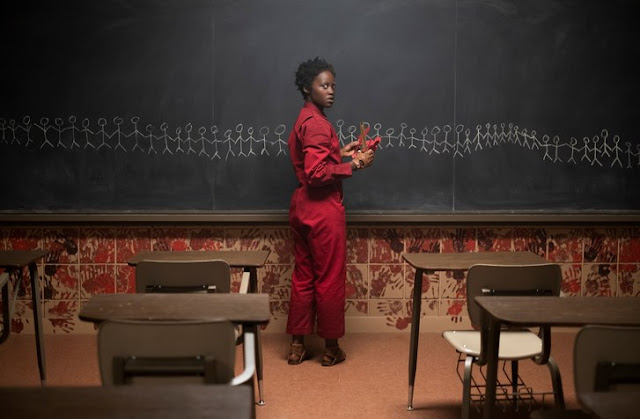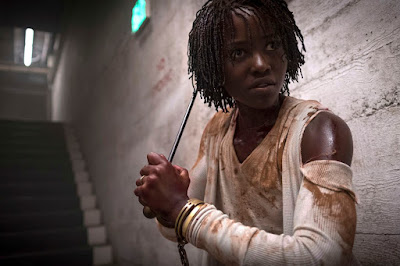'Us': A Deep Dive into Jordan Peele's Second Horror Flick
With Jordan Peele's latest blowing up the box office, here are my initial thoughts on what happened with 'Us'.
By: Josh McCormack
Have you guys seen 'Us'?
You must have. Within three days of its release, it has made over $70 million at the box office, more than tripling its estimated budget and leading it to the highest grossing opening weekend for an original concept since 2009's 'Avatar'.
So I'm assuming you guys have seen it and contributed in making the already rich Jason Blum a little richer, because we're getting deep into spoilers here. So definitely turn back now if you don't want Jordan Peele's new cinematic nightmare ruined for you.
-------------------------------------------------------------------------
*SPOILERS*
Jordan Peele's big, ambitious and sometimes uneven sophomore feature is practically designed to get people talking.
'Get Out' led to a massive national discussion itself. However, unlike that particular film, 'Us's ideas aren't as streamlined and easy to grasp.
This isn't a complaint though, because even with its questionable narrative choices I haven't been able to shake the film's bold direction and haunting storyline.
This is Jordan Peele firing on all cylinders and making a movie that's just as much for himself as it is for the audience. With sequences of pretty shocking violence, a dark sardonic sense of humor and a main character who winds up not being who we think she is for 99% of the film, this movie is certainly not meant to appeal to mass audiences in the way 'Get Out' did in 2017.
Yet, those willing to tap into 'Us's stranger, heavily genre influenced sensibilities may feel that it hits them more than Peele's previous film. That's how I feel, at least.
When talking about 'Us', the one element that absolutely can not be overlooked is Lupita Nyong'o.
If Toni Collette in 'Hereditary' was the horror queen of 2018, this year it already looks like the torch has been passed to Nyong'o who gives what may be the best performance of her already astonishing career.
Much has been written about the challenges of her dual role and her process, but to me you can't even really learn to appreciate how fantastic she is until you see the film from beginning to end.
After realizing that our protagonist has been the "tethered" version of herself all along, it completely changes how you look back on the film and her performance telegraphs so many red flags from the beginning. Having not seen the film for a second time in its entirety as of this writing and only having been able to re-experience the film via short clips uploaded to youtube, it's still amazing just how much my interpretation of what is going on through the mind of Nyongo's character, Adelaide, has changed since my initial viewing.
Nyong'o is also backed up by a fantastic supporting cast.
Peele's 'Get Out' had very few likable or trustworthy characters outside of the lead, Chris (played by Daniel Kaluuya). 'Us' on the other hand takes a long time displaying the charms and relatable family dynamics of Adelaide's two children and husband, Gabe, played with wonderful charisma by Winston Duke.
The early family focused sequences help you really learn to like these people and they also show off Peele's knack for implementing his comedic roots into a horror story rather affectively.
'Us' also features some incredible stylistic choices that prove that Peele's directing prowess was not limited to only one film.
Right off the bat, the visual language of the film is chock full of doubles.
We see a homeless man (who's the first to meet his demise) carrying a cardboard sign reading "Jeremiah 11:11". When our lead family first arrives on the beach, there shadows are exaggerated, foreshadowing (no pun intended) their dark, second selves. And even the use of scissors from our lead antagonists is a form of visual allusion to the split of two separate entities.
Peele is also able to build tension spectacularly as he did in his previous film. There are incredibly suspenseful sequences all the way through, including a truly riveting home invasion sequence. This scene is one of the best stretches of film I've seen in any horror movie of the past few years. It's tense, the score is incredible and it features nightmarish dialogue by Lupita Nyong'o.
The film is also edited so precisely.
The final confrontation in which both versions of Adelaide duke it out in the tunnels is a masterclass of editing, using their movements to call back to a flashback of them dancing as children.
Where Peele does falter just a tad is with his screenwriting. It certainly isn't bad, but the film tries to fit so many concepts into it 1 hour and 55 minute runtime that it does falter a little going from plot point to plot point, especially when we find out that the attack of the doppelgängers is a nationwide phenomenon in the start of the film's second half. Luckily, the movie is able to get focused very quickly after that, but I was worried that Peele was going to lose grasp of the wonderful sense of claustrophobia that blessed the movie's first hour.
The mythology surrounding the tethered is also a little messy and I would be more focused on the "plot holes" if the movie wasn't so damn good as a whole.
There's also that joke about Micro Machines and 'Home Alone' I could have done without, but it's whatever.
So after all of this critical analysis of the performances, the direction and the screenwriting, the big question that still looms over many moviegoers after this past weekend is; what does 'Us' mean?
Well, I've been avoiding most of the "ending explained" links on youtube even after seeing the movie, because I'm still trying to form my own feelings about the film's ending. And while nothing I say should be taken as gospel truth, to me the movie is about a woman who came from a land of suffering, found a way to rig the system in order to get a life she never could afford in ordinary circumstances and will not allow to share the wealth of her perfect life with those of her own.
The film ends with our protagonist, no longer who we started out the film thinking she was, smiling to herself now that she gets to keep the family she worked so hard to maintain, but at the cost of the entire human race.
I've seen a few things written about how this film is about the "haves" and the "have nots" in America, and while I think there is some truth to that, the thing that struck me about 'Us', at least in my initial viewing, was that it wasn't quite as overtly political as I was expecting after seeing 'Get Out'. That by no means is saying there aren't parallels to social issues in the real world (an upper middle class woman not wanting to share her wealth is basically an approximation of the GOP if you ask me), but I respect Jordan Peele for not feeling like he had to make a movie that is explicitly about something like race relations in the wake of 'Get Out'.
While 'Get Out' was an important film that handled heavy subject matter, we--as viewers--should not place him in a box as a filmmaker and say that he always needs to make a certain type of movie.
However, perhaps with my narrow focus on looking for a race allegory, I'm missing the bigger picture.
Perhaps Jordan Peele isn't trying to just make a horror movie about being black in America, but he's instead making a horror movie about America as a whole. Maybe he views America as a story of "haves" and "have nots" and what makes 'Us' more ambitious than anything is that this film is no longer just a critique on problematic, privileged white liberalism, but it is instead a critique on our country as a whole and how we treat those who have very little.
As Adelaide's tethered says; "We're American".
*
*
*
Wait a second... 'Us'--U.S.---HOLY SHIT GUYS!








Comments
Post a Comment